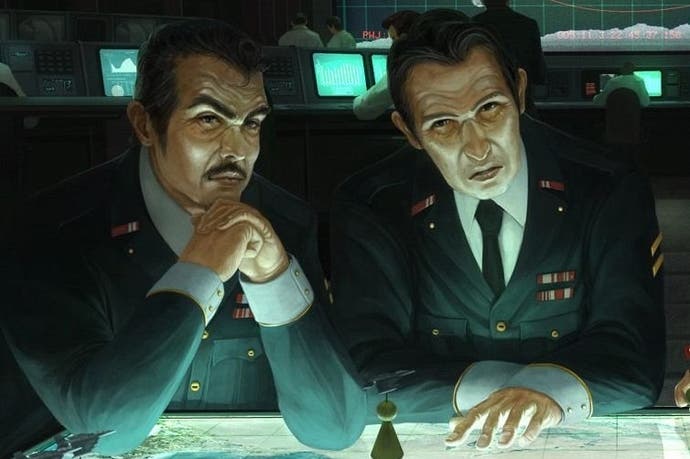Xenonauts review
X-communication.
There was always something a little wonky in the concept behind 1994's UFO: Enemy Unknown. The earth is under attack by extraterrestrials and so a global defence force is formed to counter it; fair enough. But when I try to imagine the conversations that might happen in dingy, smoke-filled bunkers somewhere, they always go like this:
"Sir, alien forces are terrorising Oslo. The city is under attack!"
"Right, send in our ground forces. How many battalions do we have?"
"Er, we have six soldiers."
"Ah, the world's best crack troops?"
"Not really. The sniper keeps shooting whoever stands in front of her in the back of the head and one soldier has never thrown a grenade on target in a dozen sorties. But he does run pretty fast the moment things go wrong."
"Can't we sack them?"
"Actually, we've promoted them both three times in a month."
"Oh. Carry on. By the way, is this the section of the wall designated for forehead collision therapy?"
"Bang away, sir. Bang away."
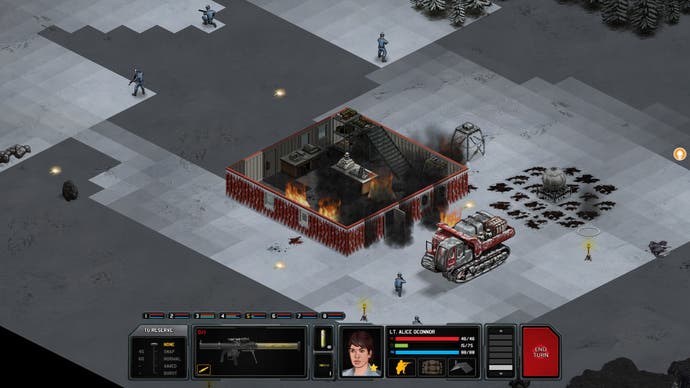
20 years ago, the first game in the X-COM series had me banging my head against a lot of surfaces. Even though I view it now through the most generous tint of rose, I still remember many of the frustrations and the feeling that I was gently, oh so gently, shepherding a team of nincompoops through battle after battle. I could never entirely trust them. These supposedly elite soldiers, each of them heavy with body armour and brandishing stolen, esoteric extraterrestrial weaponry, could at any moment make a mistake so fundamental and slapstick that the invading aliens might think they were on a hidden camera show.
Two decades on, Xenonauts is a faithful reimagining of UFO: Enemy Unknown - right down to those idiots. It has smoothed out a few creases and streamlined a few processes but it's still a reminder of just how silly, as well as how slow, its inspiration could be. It's mechanically much truer to the original than 2012's de-hyphenated XCOM: Enemy Unknown - and, to be clear, it has absolutely nothing to do with Firaxis, 2K or Julian Gollop.
It's similar enough that it'll start all the right nostalgia neurons firing off inside your skull, yet different enough that it still finds ways to surprise. Once again, you must race to the defence of your planet, intercepting the UFOs that streak across the sky and defending cities from alien assault. In time, a capable commander will come to understand the alien menace and turn the invaders' technology against them. The action is one part turn-based squad combat, one part real-time strategic management and one part real-time interceptions, lightly drizzled with a helping of resource management.
Squad skirmishes are the mainstay. Whenever you down a UFO, respond to an alien assault or even bring the fight to the aliens, you take charge of a small squad you've personally equipped. This turn-based combat reprises the finer detail that XCOM: Enemy Unknown eschewed and each soldier has a set number of time units. Everything, from walking to shooting to crouching, eats a certain amount of these units. Time becomes a currency that you must ration as carefully as possible as, turn by turn, you inch your troops out of their landing craft and across the map, pushing back the fog of war and eliminating or capturing extraterrestrials as you go.
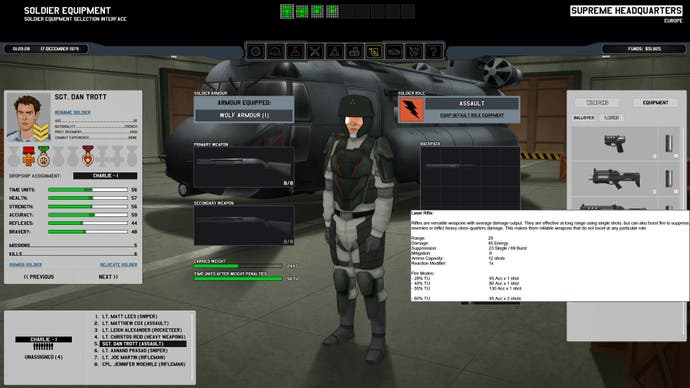
It's a slow and methodical business of finding beetles under rocks. You peek around every corner, peer through every window and squint into each loft space you pass. It's not uncommon for gunfire to come from nowhere or for aliens to announce themselves with sniping or grenades well before you spot them. An unscrupulous commander may not mind firing back into the unknown, lobbing grenades through dark windows or blasting down walls with missile launchers. Civilians dot the maps, scurrying back and forth in panic, but there's every chance you won't hit them.
Anyway, there's a certain joy in blowing apart the humdrum environments you fight your way through. Sometimes you miss an alien and machine-gun a photocopier. Sometimes you rocket a bus. Sometimes you throw a grenade into a toilet just for kicks. Saving the world shouldn't be so juvenile, but nobody bills you when you blow up a bus stop.
There are still bills to pay as, strangely enough, saving the world does involve balancing your books. A strategic overview shows a naked earth that, with time, you gradually cloak in radar coverage as you construct new bases with additional facilities and interceptor bays. Your ability to provide each region of the world with protection determines the funding they grant you and bankruptcy is as much your enemy as any alien threat.
So it's strange when the regions that pay for your dinner don't always reward you in proportion to your effectiveness. Regions that have had excellent protection from alien incursions are sometimes still grumpy; others, barely attended to, ignore your failure to clear their airspace and drop more coins into your can. It doesn't always make sense.
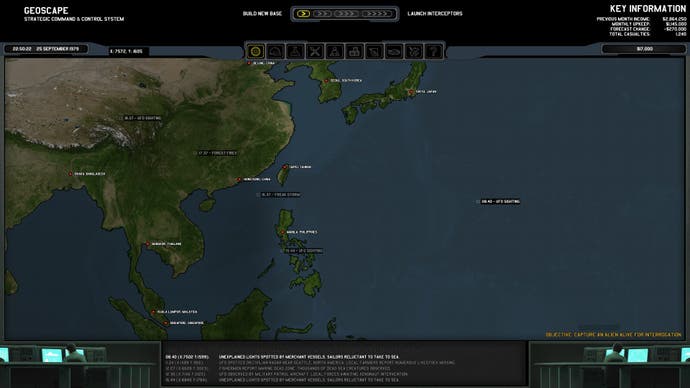
Still, so far, so familiar. But it's not long before Xenonauts' differences, both stark and subtle, come to the fore, such as its new take on UFO interception. You can auto-resolve interceptions should you choose, but otherwise each dogfight is presented as a top-down tactical overview, fighters and UFO twirling amongst one another as you order pilots to arm missiles, fire afterburners or bug out if things are going wrong. It's all very simple, but it's effective and, critically, it's very quick. Efficient.
Efficiency is the watchword here and, the more you explore Xenonauts' subtly different shape, the more you see how it has found ways to streamline its inspiration. Gone is a great deal of fiddly weapon procurement and stores management. Soldiers can be assigned specific loadouts and are (usually) rearmed. Lost interceptors are replaced. Many weapons are upgraded automatically. Xenonauts is far less a game about being a quartermaster and far more a game about being a quarterback, the key player in the battle against off-world invaders. It doesn't matter how many flares you remembered to buy, it says, when our very existence is at stake.
Yet you can still feel like a quarterback playing with a clumsy, colliding team of amateurs. Part of the challenge of UFO: Enemy Unknown was the blatant crappiness of your soldiers. Once again, those selected to defend the world start off on the less helpful side of mediocre. Experience in battle improves their abilities, granting them medals and incremental improvements to their skills, but their progress is slow and, some days, you'll have little sympathy for them as, once again, they spray their weapons wildly into midair or flee the moment something goes awry.
Their slow advancement is mirrored in the pacing of the missions. The diligence that ground combat demands means battles are plodding, precise affairs that can become drawn-out and repetitive. You'll down dozens of the same class of UFO and find yourself carefully assaulting their camping, hunkering crews the same way over and over again. In an attempt to mitigate this, Xenonauts allows you to airstrike crash sites, offering welcome relief, but it comes at the cost of decreased revenue and no opportunity for precious, precious experience.
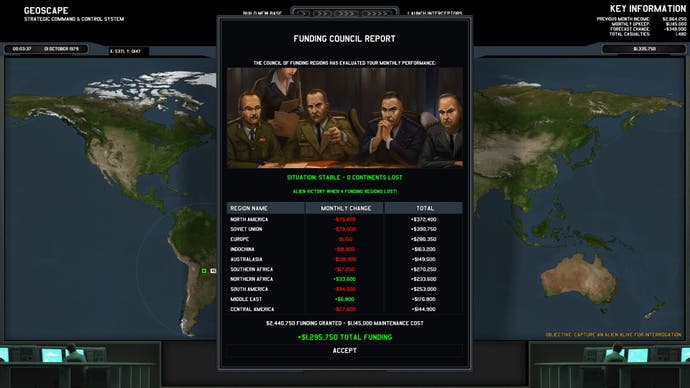
Xenonauts is not a quick game and its campaign demands scores of hours, during which its subtle details repeat, its shine dulls and its flaws come to the fore. None of these are glaring, but their familiarity quickly breeds contempt. The ground combat maps repeat too soon and, as you come to learn them, you start to question the aliens. They're not the most co-ordinated bunch and I couldn't shake the impression that, before I uncovered each new target, they were simply wandering in the darkness without any sense of purpose.
The fixed perspective occasionally occludes soldiers and important details, while the line-of-sight mechanics can be a little kooky and sometimes you're able to see aliens through walls. Occasionally, inventories don't update between missions and if you don't double-check your soldiers you can find yourself going into battle without the gear you've come to rely on. Very rarely, there are crashes to desktop while you're lording over the strategic screen; relatively speaking, they're rare, but during a game in which you'll likely invest tens of hours, you'll see a few. Don't forget to save.
A lot of the charm peels away after the tenth firefight in that same factory district, but at its core Xenonauts has solid mechanics and is true to its inspiration, fixing many of its forebear's flaws. At its worst, it can become tedious and samey, but even after countless interceptions, skirmishes and alien assaults it can still produce moments of tension or excitement: moments when a soldier spins on the spot only to realise an alien is stood right behind them, moments when a lucky shot catches a UFO's reactor and turns a nearby alien commander into a pile of purple goo.
This game rewards the most patient of tacticians. If that's you - if you're the person with enough time units of your own - it will certainly satisfy. Xenonauts knows exactly who its audience is, exactly what it's aiming for and, while it may never achieve a wider appeal, it will capture that audience in a very familiar act of alien abduction.
